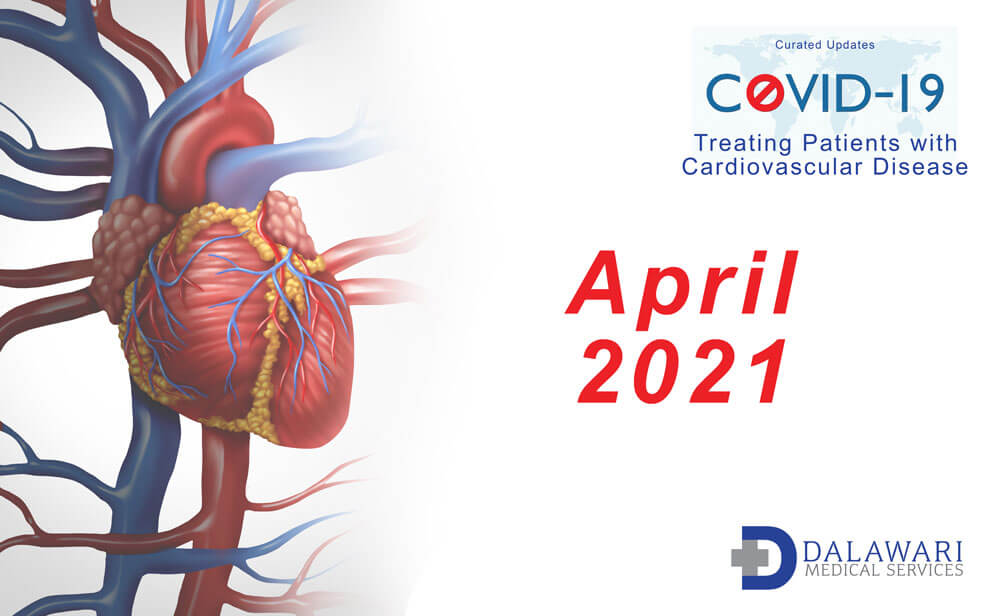COVID-19: News & Updates from April 2021
As a response to the Coronavirus/Covid-19 outbreak, many medical associations and organizations have released statements specifically related to treatment for cardiovascular patients.
These resources provide credible and trustworthy information. Many if not most, speak to the need for more detailed research and data, to help guide us as we develop new standards of practice to ensure optimal care based on clinical practice rather than speculation.
- Wear a mask in public places
- Social distancing - stay at least 6 feet away from other people
- Wash your hands frequently - with warm soapy water for at least 30 seconds
- Avoid crowds, confined and poorly ventilated spaces.
Biden bans most travel to U.S. from India to limit COVID-19 spread
30 April, 2021 - Reuters
U.S. President Joe Biden on Friday imposed new travel restrictions on India in light of the COVID-19 epidemic, barring most non-U.S. citizens from entering the United States.
The new restrictions, which take effect on Tuesday, May 4 at 12:01 am ET (0401 GMT), are on the advice of the U.S. Centers for Disease Control and Prevention (CDC) and were imposed because "the magnitude and scope of the COVID-19 pandemic" in India was "surging," the White House said.
Adults in all U.S. states are now eligible for vaccination, hitting Biden’s target. Half have had at least one dose.
19 April, 2021 - New York Times
All adults in every U.S. state, Washington, D.C., and Puerto Rico are now eligible for a Covid-19 vaccine, meeting the April 19 deadline that President Biden set two weeks ago.
“For months I’ve been telling Americans to get vaccinated when it’s your turn. Well, it’s your turn, now,” Mr. Biden said Sunday on a program called “Roll Up Your Sleeves” on NBC. “It’s free. It’s convenient and it’s the most important thing you can do to protect yourself from Covid-19.”
Ramadan, COVID-19 and the cardiac patient
16 April, 2021 - Heart.Org
With the dawn of the Islamic lunar month of Ramadan, many Muslims around the world begin observing an absolute fast from dawn to dusk, abstaining from food, drink, and oral medications.
The fast naturally also entails a change in lifestyle, sleeping patterns, and adjustments of salt and fluid intake, all of which have implications for the cardiac patient. Furthermore, as they are generally known to be on multiple medications, depending on the number of hours of fasting, there might be a need for adjusting drugs, doses, and timings.
Blood Clots More Likely After Covid-19 Than After Vaccination, Study Finds
15 April, 2021 - WSJ (Wall Street Journal)
Review by Oxford shows risk of rare, serious blood clotting is eight to 10 times greater in people who caught the coronavirus than among people who received any of the first three Western-developed vaccines
A study by the University of Oxford found the risk of rare but sometimes-deadly blood clotting is roughly eight to 10 times greater in Covid-19 sufferers than among people who have received any of the first three Western-developed vaccines widely available.
The study, involving vaccinations from Pfizer Inc. and BioNTech SE , another from Moderna Inc. and one from AstraZeneca PLC, adds to competing evidence related to blood clotting that regulators and governments may need to take into account as they weigh continued deployment of vaccines
Patient Use and Clinical Practice Patterns of Remote Cardiology Clinic Visits in the Era of COVID-19
05 April, 2021 - JAMA Network (Journal of American Medical Association)
Original Investigation | Health Policy
Key Points
Question: Is the transition to remote cardiology ambulatory visits during the COVID-19 pandemic associated with disparities in patient access to care, ordering of diagnostic tests, and/or medication prescribing?
Findings: In this cross-sectional study of 176 781 ambulatory cardiology visits, patients using COVID-era remote visits were more likely to be Asian, Black, or Hispanic individuals, have private insurance, and have cardiovascular comorbidities. Compared with pre-COVID in-person visits, clinicians during COVID-era video and telephone visits had a significantly lower odds of ordering any medication as well as most tests.
Meaning: Remote cardiology clinic visits were used more often by certain traditionally underserved patient groups but were also associated with less frequent testing and prescribing.
Do you have questions about a medical case or need help understanding treatment plans and options?
Health & Patient Advocacy | Medical Case Review
Medical Expert Witness
Dalawari Medical Services - Medical Consulting
Click here to Contact Us via email or Call + (804)-991-4109




